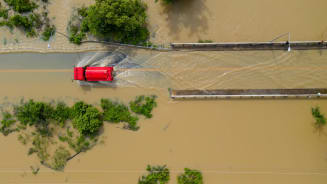
Podcast 23 mins
Better Being Series: Understanding Burnout in the Workplace
With several years of upheaval in the business world, strong management is important for organizations to stay competitive. As a result, the need for constructive manager training has become crucial in order to equip them with the necessary knowledge and tools to succeed.
“The role of managers has changed,” says Charlotte Schaller, partner and head of Aon Assessment Solutions UK. “Besides the changes of the last few years, there’s also a huge emphasis now on employee wellbeing and the link to productivity, which has a massive impact on the role the manager plays in supporting their team through these times. Getting the balance between being productive, being caring and setting targets is very hard.”
One of the best ways to ensure that managers are prepared for today’s challenges is effective training — or retraining, as the case may be.
The changing role of the manager serves to complicate the already-demanding directive to hire, train and retain capable workers in an uncertain job market. It’s essential for manager training to empower managers to embrace change and continually update their skills and knowledge to stay competitive.
“You can’t just assume that your most experienced person is going to be your best manager anymore,” says Schaller. “They might be incredible at their job, but now it’s about helping others be incredible at their job.”
Management styles have largely shifted from solely focusing on directing employees to now engaging, instructing and unifying colleagues.
“Today’s successful managers and successful leaders are involving others in key decisions,” says Schaller. “Managers are moving from an exclusive, ‘I know the answers’ to a more inclusive ‘How can we all do this together?’ mindset.”
As managers work to bring their teams together, they open up new opportunities to facilitate growth and professional development.
“Managers now are trying more to challenge people,” Schaller explains. “It’s not just about problem solving issues for now. It’s about looking ahead and challenging people to discover new and better ways to do things.”
Many businesses’ embrace of hybrid work environments demonstrates a lasting impact of the COVID-19 pandemic. Though the pandemic presented many workplace challenges, it also provided a new framework for management.
“During the pandemic, managers were more empowered to ask people how they were coping and what was happening in their lives,” Schaller says. “That doesn’t disappear now. Managers should consider why someone’s working for you, what they’ve done in order to get to work that day and what’s going to happen when they put their pen down at the end of the day.”
Now that managers contend with team members on screens as well as in person, flexibility and the willingness to adapt to new circumstances are increasingly vital in the workplace. Sometimes, this simply means taking extra steps to be prepared. “Having all that technology in place so that it doesn’t ruin a meeting and you’re not spending hours trying to set things up can make a big difference,” says Schaller.
In addition to reskilling and upskilling existing employees, leaders can rethink their recruitment practices and make use of new technologies when adding managers to their teams.
Offering an appealing, comprehensive combination of benefits and rewards is increasingly critical in recruiting and retaining managerial talent. “The employee value proposition is key for retention,” Schaller says. “That’s not just the pay and benefits now. It’s also the company culture. In what direction are we heading and who is leading us forward? How do we work collaboratively to achieve outcomes and what is the environment in which we work?”
Leaders can also use AI and other digital solutions to acquire and retain talented managers. “Using technology to attract a wider pool of candidates and to help select candidates saves time, but it also puts some science behind the process,” Schaller says. “It removes the bias that maybe a human person would have when they’re just going through a standard recruitment process. It improves diversity because you don’t necessarily focus on past experience or educational background — you’ve really done a lot of the analysis upfront.”
Though there is no single approach to training effective managers, best practices are rising to the surface as more businesses develop their management teams.
“Many manager trainings are scenario-based, where you ask people, ‘What would you do in this situation?’ That can be using a virtual platform or through a role play, or even an in-person assessment or development center,” says Schaller. “Organizations are putting their managers through development programs where they then come away with some tips and direction to learning.”
Given the increase in hybrid work environments, companies must weigh the merits of having manager training take place in person or virtually. According to Schaller, the setting is secondary to the substance of the training.
“There’s no right or wrong answer to whether a company should host their development centers virtually or in person. It’s obviously cost-saving if you do them virtually. And it can be a very engaging process still if you set it up in a virtual way. But mostly it’s about what behaviors that we’re tapping into and being really clear on what ‘good’ looks like,” says Schaller.
Furthermore, exercises should go beyond setting expectations in order to give managers actionable experience.
“The exercises need to be real,” explains Schaller. “Managers will likely be expected to do some form of personality questionnaire, but can also greatly benefit from a realistic job preview-type exercise — something they’re going to actually be doing day-to-day. You need to give your managers the insight on how to develop their teams. There’s a lot riding on them to be able to manage how others learn and grow.”
General Disclaimer
The information contained herein and the statements expressed are of a general nature and are not intended to address the circumstances of any particular individual or entity. Although we endeavor to provide accurate and timely information and use sources we consider reliable, there can be no guarantee that such information is accurate as of the date it is received or that it will continue to be accurate in the future. No one should act on such information without appropriate professional advice after a thorough examination of the particular situation.
Terms of Use
The contents herein may not be reproduced, reused, reprinted or redistributed without the expressed written consent of Aon, unless otherwise authorized by Aon. To use information contained herein, please write to our team.
Our Better Being podcast series, hosted by Aon Chief Wellbeing Officer Rachel Fellowes, explores wellbeing strategies and resilience. This season we cover human sustainability, kindness in the workplace, how to measure wellbeing, managing grief and more.
Expert Views on Today's Risk Capital and Human Capital Issues
Expert Views on Today's Risk Capital and Human Capital Issues
Expert Views on Today's Risk Capital and Human Capital Issues
Better Decisions Across Interconnected Risk and People Issues.
The construction industry is under pressure from interconnected risks and notable macroeconomic developments. Learn how your organization can benefit from construction insurance and risk management.
Stay in the loop on today's most pressing cyber security matters.
Our Cyber Resilience collection gives you access to Aon’s latest insights on the evolving landscape of cyber threats and risk mitigation measures. Reach out to our experts to discuss how to make the right decisions to strengthen your organization’s cyber resilience.
Our Employee Wellbeing collection gives you access to the latest insights from Aon's human capital team. You can also reach out to the team at any time for assistance with your employee wellbeing needs.
Explore Aon's latest environmental social and governance (ESG) insights.
Our Global Insurance Market Insights highlight insurance market trends across pricing, capacity, underwriting, limits, deductibles and coverages.
Better Decisions Across Interconnected Risk and People Issues.
How do the top risks on business leaders’ minds differ by region and how can these risks be mitigated? Explore the regional results to learn more.
Trade, technology, weather and workforce stability are the central forces in today’s risk landscape.
These industry-specific articles explore the top risks, their underlying drivers and the actions leaders are taking to build resilience.
Our Human Capital Analytics collection gives you access to the latest insights from Aon's human capital team. Contact us to learn how Aon’s analytics capabilities helps organizations make better workforce decisions.
Read our collection of human capital articles that explore in depth hot topics for HR and risk professionals, including using data and analytics to measure total rewards programs, how HR and finance can better partner and the impact AI will have on the workforce.
Explore our hand-picked insights for human resources professionals.
Our Workforce Collection provides access to the latest insights from Aon’s Human Capital team on topics ranging from health and benefits, retirement and talent practices. You can reach out to our team at any time to learn how we can help address emerging workforce challenges.
Our Mergers and Acquisitions (M&A) collection gives you access to the latest insights from Aon's thought leaders to help dealmakers make better decisions. Explore our latest insights and reach out to the team at any time for assistance with transaction challenges and opportunities.
The challenges in adopting renewable energy are changing with technological advancements, increasing market competition and numerous financial support mechanisms. Learn how your organization can benefit from our renewables solutions.
How do businesses navigate their way through new forms of volatility and make decisions that protect and grow their organizations?
Our Parametric Insurance Collection provides ways your organization can benefit from this simple, straightforward and fast-paying risk transfer solution. Reach out to learn how we can help you make better decisions to manage your catastrophe exposures and near-term volatility.
Our Pay Transparency and Equity collection gives you access to the latest insights from Aon's human capital team on topics ranging from pay equity to diversity, equity and inclusion. Contact us to learn how we can help your organization address these issues.
Forecasters are predicting an extremely active 2024 Atlantic hurricane season. Take measures to build resilience to mitigate risk for hurricane-prone properties.
Our Technology Collection provides access to the latest insights from Aon's thought leaders on navigating the evolving risks and opportunities of technology. Reach out to the team to learn how we can help you use technology to make better decisions for the future.
Our Trade Collection gives you access to the latest insights from Aon's thought leaders on navigating the evolving risks and opportunities for international business. Reach out to our team to understand how to make better decisions around macro trends and why they matter to businesses.
Better Decisions Across Interconnected Risk and People Issues.
With a changing climate, organizations in all sectors will need to protect their people and physical assets, reduce their carbon footprint, and invest in new solutions to thrive. Our Weather Collection provides you with critical insights to be prepared.
Our Workforce Resilience collection gives you access to the latest insights from Aon's Human Capital team. You can reach out to the team at any time for questions about how we can assess gaps and help build a more resilience workforce.

Article 11 mins
As digital claims transformation accelerates, organizations are adopting AI, automation and analytics to improve speed, transparency and accuracy — and unlock deeper insights into risk profiles, enhancing long-term resilience.

Article 9 mins
In today’s volatile casualty market, businesses face mounting uncertainty from rising loss exposures and shifting risk transfer dynamics. Multi-year structured programs and other alternative risk transfer solutions can offer a smarter way to align risk duration with capital strategies.

Article 12 mins
Buyer-friendly conditions in the UK insurance market remain and prices continue to soften across most lines. While there are opportunities to reinstate limits and broaden cover, the focus for insurance buyers on providing high quality risk information and demonstrating good risk management remains.

Article 4 mins
Litigation from workers’ compensation and liability claims is not inevitable. Discover common myths and seven practical strategies using prevention, documentation, and AI to help avoid lawsuits and protect your organization.

Article 7 mins
In a conversation with Trade Finance Global’s (TFG) Deputy Editor, Mahika Ravi Shankar, Madeleine Whiteley, Senior Client Manager at Aon, explored how credit insurance is helping energy clients navigate volatility, adapt to the transition to renewables, and manage the uncertainties of today’s market

Article 3 mins
As the U.S. renewable energy market accelerates, tax insurance is becoming critical to unlock investment, manage uncertainty, and protect returns as evolving legislation reshapes tax credits that underpin project viability.

Article 12 mins
Innovation has always driven growth in life sciences. Yet today, it’s not enough to keep organizations relevant and resilient. As global healthcare changes rapidly, the future of care depends on how well leaders align their breakthroughs with real-world healthcare delivery, affordability and trust.

Article 9 mins
While cancer care and specialty medicines are familiar culprits behind rising U.S. healthcare costs, benefit leaders should also watch out for less obvious factors driving up expenses. Taking a holistic view requires being aware of these hidden threats as you work to manage costs.

Article 8 mins
Advanced analytics empower forward-thinking risk leaders to secure better terms, anticipate volatility and build resilience. Explore three strategies to future-proof your property program through analytics.

Article 7 mins
The Trump Administration has introduced several initiatives aimed at reducing prescription drug costs. Here’s what these changes could mean for employer-sponsored plans.

Article 8 mins
The global medical trend rate is projected to dip below double digits for the first time in three years to 9.8%. It may be a hopeful sign that cost increases have plateaued, but cost increases are still elevated. We explain the risks and conditions behind the increase so employers can prepare.

Article 9 mins
Retailers in North America are navigating intense competition, shifting consumer demands and rising costs. Add to that a wave of evolving risks — from cyber to litigation — and the pressure mounts. These six insights can help retailers rethink their risk strategy.

Article 8 mins
Benefit platforms are revolutionizing the employee experience by making it easier for people to choose the right benefits at the right time. New technologies including AI, along with data insights, are enabling more personalized and relevant benefit choices.

Article 8 mins
Data center construction is booming — but cyber risk management hasn’t kept pace. As digital infrastructure becomes ever more critical, fit-for-purpose insurance solutions are essential to protect projects from costly cyber events that derail timelines and budgets.

Article 7 mins
Captives are moving from a reactive stopgap to a core, strategic tool for managing cyber risk — helping organizations drive efficiency, manage volatility and build resilience in a rapidly evolving risk environment.

Article 23 mins
Buyer-friendly conditions persisted in Q3, with ample capacity and intense competition driving continued price reductions and broader coverage for preferred risks, especially in property, cyber, and directors and officers.

Article 10 mins
Cost inflation, project complexity and tight schedules aren’t the only pressures facing infrastructure stakeholders. Emerging risks — from design and contract misalignment to tech-driven vulnerabilities — demand proactive risk management across the entire project lifecycle.

Article 9 mins
Conversations at work about mental health and finances can be daunting. That’s especially true for male employees, who fear the associated stigma. Employers can help those conversations by supporting a healthy culture and providing benefits designed to help with financial and mental wellbeing.

Article 5 mins
As H1B visa costs surge, organizations face complex decisions in talent strategy and global workforce planning. This article explores how employers, talent, and industry must adapt holistically to remain resilient and competitive amid sweeping immigration and market changes.

Article 41 mins
Explore how risk perceptions vary across countries with insights from Aon’s 2025 Global Risk Management Survey.

Article 10 mins
Latin American organizations face converging risks, but those who rethink resilience can unlock growth and gain a competitive edge.

Article 1 mins
Aon’s 2025 Global Risk Management Survey explores how organizations across four regions are responding to top risks—revealing both the challenges they face and the opportunities to build resilience in a fast-changing world.

Article 12 mins
Asia Pacific’s risk landscape is shifting fast. Organizations that rethink resilience as a strategic differentiator will be best placed to navigate volatility and seize emerging opportunities.

Article 10 mins
North American organizations face intensifying risks across cyber, supply chain, reputation, and talent. Those who rethink resilience and risk management can turn uncertainty into a source of competitive advantage.

Article 10 mins
In a region shaped by volatility and transformation, EMEA organizations are rethinking risk and resilience to unlock competitive advantage and navigate a rapidly evolving global landscape.

Article 10 mins
From drones that dodge surveillance to deepfakes that unlock doors, AI is reshaping physical security. It’s time for risk managers to rethink how they protect their organizations.

Article 7 mins
There are a few important ways AI is already influencing the health and benefit ecosystem in the U.S. Here’s how HR teams can harness their vendor ecosystem and use this technology to influence better health outcomes for their workforces.

Article 13 mins
Artificial intelligence is driving unprecedented demand for data center power, straining global grid capacity and reshaping energy strategies. Developers are racing to secure reliable energy but face complex risks and challenges.

Article 11 mins
As in-demand, high-value technology cargo travels through complex supply chains, any disruption can trigger costly delays and reputational damage. Leaders can manage volatility with a future-ready risk management approach backed by innovative insurance solutions and data-driven logistics.

Article 5 mins
Global voluntary turnover remains low, shaping cautious 2026 salary budgets and prompting a renewed focus on employee development to sustain engagement. Employers are balancing cost control with strategic investments in skills, paying high performers, pay equity and total rewards.

Article 8 mins
Financial institutions are navigating a landscape of converging risks, from cyber threats and regulatory complexity to economic volatility and geopolitical disruption.

Article 9 mins
Construction and real estate organizations are navigating a risk landscape shaped by economic volatility, digital acceleration and workforce disruption.

Article 1 mins
Business risks impact industries in different ways. Aon’s 2025 Global Risk Management Survey reveals how organizations across nine sectors are responding to today’s most pressing threats—from geopolitical volatility and cyber risk to supply chain disruption and talent shortages.

Article 10 mins
Surging input costs, supply chain fragility and geopolitical instability are reshaping the risk landscape for the food, agribusiness and beverage (FAB) industry. As organizations face mounting pressure on margins and operations, leaders are rethinking risk strategies to unlock resilience and growth.

Article 11 mins
Aon’s Global Risk Management Survey shows insurers face a convergence of risks — cyber, climate and geopolitical volatility — that demand strategic resilience, sharper underwriting and innovation to stay relevant in a shifting landscape.

Article 10 mins
Faced with fragile supply chains, regulatory upheaval and rising competition, life sciences firms are reframing risk as a strategic enabler – using analytics and alternative capital to protect innovation and unlock growth.

Article 10 mins
As geopolitical instability, workforce disruption and rapid technological change converge, the transportation and logistics industry is undergoing a strategic transformation. Organizations are rethinking supply chains, investing in automation and reshaping workforce strategies to build resilience.

Article 11 mins
From business interruption and commodity price volatility to shifting regulations and cyber threats, risks are converging to reshape the operating environment for the natural resources industry.

Article 9 mins
As disruption accelerates across the TMC industry, organizations face a complex web of risks — from cyber threats and AI upheaval to regulatory shifts and intensifying competition. Leaders are rethinking risk to build resilience, unlock growth and stay ahead in a rapidly evolving landscape.

Article 10 mins
From commodity price volatility and economic uncertainty to supply chain disruption and cyber threats, the industrials and manufacturing industry faces a convergence of risks that are reshaping the operating environment and requiring a new approach to risk.

Article 6 mins
Risk buyers can build resilience in their property portfolios by implementing a risk capital strategy that utilizes alternative risk transfer sources to access capital and support long-term program stability.

Article 10 mins
The global cyber and tech errors and omissions market continues to favor buyers — for now. As AI-driven threats, privacy litigation and supply chain exposures intensify, forward-thinking organizations are using this window to build resilience.

Article 10 mins
Succession planning is evolving. By gathering comprehensive data and adopting predictive approaches, organizations can better anticipate workforce needs and build deeper benches of future leaders.

Article 7 mins
Business interruption is the second-highest global risk in 2025 — but is expected to fall to seventh place by 2028. As interconnected threats multiply, from cyber attacks to climate events, organizations must diversify supply chains, embed geopolitical insight and regularly update continuity plans.

Article 6 mins
Cash flow and liquidity risk re-enters the top ten global risks in 2025 — and is expected to remain in tenth place by 2028. Amid an uncertain macroeconomic outlook, organizations must strengthen forecasting and unlock working capital to build financial resilience.

Article 7 mins
Commodity price risk ranks sixth globally in 2025 — and is forecast to climb to fourth place by 2028. With supply chains strained by geopolitical tensions and climate disruption, organizations should consider hedging strategies, diversifying sourcing and exploring innovative risk transfer solutions.

Article 6 mins
Cyber risk tops the global risk agenda in 2025 — and is forecast to retain the number one position through to 2028. As digital threats evolve, organizations should strengthen resilience, quantify exposure and adapt their risk strategy.

Article 5 mins
Damage to reputation or brand ranks eighth globally in 2025 — but is expected to fall to nineteenth by 2028. In an era of cyber threats, ESG scrutiny and social media amplification, organizations should quantify reputational risk and embed preventive measures into enterprise strategy.

Article 6 mins
Geopolitical volatility ranks ninth globally in 2025 — and is forecast to rise to fifth by 2028. With conflict, trade disruption and political instability on the rise, organizations must monitor global developments, regularly assess operational exposure and conduct scenario planning.

Article 5 mins
Increasing competition ranks as the fifth biggest global risk in 2025 — and is projected to climb to number three by 2028. As technological disruption, talent scarcity and geopolitical shifts intensify market pressure, organizations must embrace agility, and rethink competitive strategy.

Article 8 mins
Regulatory change ranks as the fourth biggest global risk in 2025 — and is expected to fall to sixth place by 2028. As policy shifts accelerate across sustainability, technology, trade and the workforce, organizations must adopt agile compliance strategies and unlock proactive risk management.

Article 9 mins
Supply chain failure ranks seventh globally in 2025 — and is projected to fall to twelfth place by 2028. As weather-related disruption, geopolitical tension and cyber threats converge, organizations must balance efficiency with resilience and diversify sourcing.

Article 1 mins
As risks increasingly overlap and evolve, managing them demands more than reactive strategies. This chapter explores the top-ranked risks from the survey and highlights how organizations that take a proactive, integrated approach can turn complexity into opportunity.

Article 6 mins
Economic slowdown ranks as the number three global risk in 2025 — and is projected to rise to number two by 2028. Amid trade tensions, inflation and geopolitical instability, organizations must strengthen liquidity, enhance workforce agility and rethink capital strategies to stay resilient.

Article 11 mins
Spanish energy multinational, Iberdrola – a leader in grids, storage and clean energy – talks with Aon about its efforts to adapt and respond to climate impacts through its shift towards renewables and building a workforce for the future.

Article 6 mins
Total rewards professionals must adapt quickly to changes in the workforce. Whether it's personalization of benefits powered by AI or a whole new language around total rewards, the near future may look very different than the status quo.

Article 10 mins
As pay transparency regulations increase, companies must update their pay-for-performance strategies and ensure performance management and compensation are clear, fair and well-documented.

Article 17 mins
Data and analytics can unlock value for HR professionals in a variety of ways. From a unified global benefits perspective to personalizing total rewards, gathering and analyzing the right types of data help companies optimize what can be their biggest expense.

Article 12 mins
Aon’s 2025 U.S. Health Survey shows how leading employers are responding to rising people risks by evolving their benefit strategies to address affordability gaps, legal pressures and rising employee expectations.

Article 8 mins
SPACs are staging a comeback, but the risks that surrounded them in prior cycles remain. The challenge is to lead with proactive, strategic risk transfer that keeps stakeholders and balance sheets protected in a fast-evolving landscape.

Article 13 mins
Efficiency, safety and innovation are no longer enough in aviation. Leaders must now take decisive action to manage emerging risks and future-proof operations in a sector under intense scrutiny.

Article 10 mins
The transportation industry is one of the highest emitters of greenhouse gases — and among the most primed for change — but the journey to decarbonize remains complex. Stakeholder collaboration will be critical in making sustainable fuel mainstream in aviation and marine.

Article 8 mins
How pay and benefits are managed in M&A transactions creates a lasting impression on employees. Mismanagement can lead to disengagement and attrition, eroding deal value. But the challenge of integrating employee benefits can also bring opportunities to improve business outcomes.

Article 5 mins
In a rapidly evolving tax environment, tax insurance is more than a safeguard — it’s strategic risk capital that unlocks value and accelerates deal confidence.

Article 5 mins
Despite unprecedented investment in digital transformation across Asia Pacific, there is a disconnect between cyber risk and capital allocation. Organizations are racing to innovate, yet the adoption of cyber risk capital trails behind the velocity of cyber threats.

Article 8 mins
For public companies and their executives, facing a Securities Class Action (SCA) can be an overwhelming and unprecedented time. While the stakes are high, the procedural roadmap of an SCA typically follows a consistent trajectory.

Article 12 mins
Strategic acquisitions and divestitures are essential for survival and growth in the FAB industry, but increasing risks demand a reevaluation of traditional dealmaking tactics.

Article 12 mins
Relevance is not a phase — it’s a discipline. In a market defined by volatility, insurers must embed strategic relevance into every decision to outperform through the cycle.

Article 9 mins
Climate change is now a central disruptor for FAB industries worldwide, impacting every tier, from raw production to global supply chains. Extreme weather, shifting rainfall patterns and regulatory changes are altering the landscape for every organization within the value chain.

Article 6 mins
Patient access to critical life sciences products is at risk when supply chains are disrupted. In a dynamic risk landscape, organizations are leveraging stock throughput insurance along with advanced risk strategies to ensure continuity, compliance and reputation.

Article 5 mins
Organizations must prioritize addressing critical cyber security vulnerabilities to comply with the EU’s NIS2 Directive and help bolster their resilience against cyber threats.

Article 7 mins
Pay transparency is more than another regulatory mandate. It’s a foundational shift in how leading organizations are building resilient cultures and future-ready workforces — especially as scrutiny extends beyond base pay.

Article 22 mins
Dynamic trends are influencing the size and complexity of claims around the world. Proactive claims management can help organizations recover swiftly after a loss event and manage potential claims exposures.

Article 6 mins
While the global property insurance market currently favors buyers, it is uncertain how long this will last. Businesses should act now by adopting a proactive, data-driven property risk strategy that aligns financial stability and risk appetite with market dynamics.

Article 7 mins
Non-profit organizations in the U.S., Canada and the UK in particular, face unprecedented regulatory scrutiny and financial instability. Here are ways to strengthen investment strategies at a critical time using an OCIO model.

Article 10 mins
Avoid limiting a portfolio’s capacity based on the capabilities or bandwidth of an existing process by working with the right partner.

Article 10 mins
The rapid growth of renewables demands innovative risk solutions. Captive insurance offers a strategic, flexible approach to managing evolving risks — helping energy leaders navigate volatility, optimize capital and unlock new opportunities in the transition to sustainable power.

Article 8 mins
The energy landscape is rapidly changing, presenting the re/insurance industry a unique opportunity to facilitate the transition to a sustainable economic model.

Article 11 mins
Against a backdrop of unsettled global markets, financial institutions can still capitalize on M&A opportunities by refining strategies and retaining focus on long-term ambitions.

Article 9 mins
Mass timber construction is gaining traction for its sustainability and efficiency, yet it brings distinct insurance and risk management challenges that require industry collaboration and proactive strategies.

Article 12 mins
As business demands grow more complex, employers must offer a total rewards package that balances the varied needs of the workforce with financial sustainability. Explore ways to ensure an effective total rewards program with data and timely communications.

Article 6 mins
Forecasters predict another above-average North Atlantic hurricane season. Businesses should use their saved premium dollars to strengthen their hurricane-prone properties and workforce, and treat risk management as a strategic asset.

Article 9 mins
The global marine cargo market faces many risks, ranging from shipping delays to geopolitical tensions. These challenges can be mitigated through a risk capital approach, which uses strategic capital allocation and data-driven insights.

Article 8 mins
Ensuring the safe delivery of construction materials along shifting trade channels is no simple endeavor. Learn how specialized insurance and risk management can support the transportation of construction cargo and help ensure project success.

Article 9 mins
Industry shifts and innovations are creating both new opportunities and challenges for life sciences organizations. Optimizing risk capital can enable business leaders to uncover cost efficiencies, strengthen resilience and enhance control.

Article 13 mins
The FAB industry faces significant supply chain challenges requiring innovative solutions and strategic planning. As organizations work to optimize capital and manage costs, they must also address geopolitical risks and regulatory updates.

Article 11 mins
With rapid technological advancements, directors and officers face increasing liabilities. Proactive risk management and board oversight can ensure organizational resilience.

Article 10 mins
In today's uncertain economic climate, finance leaders must innovate beyond traditional financial metrics, managing risk capital through targeted risk strategies, holistic capital approaches and proactive stances toward emerging threats.

Article 6 mins
With looming deadlines on pay transparency regulations, establishing an effective job architecture is foundational to compliance and preparation. We explore how a data-led approach can speed the process while maintaining objectivity.

Report 13 mins
Global business leaders highlight risks linked to trade as some of their top concerns — both physical and financial. While the topic is complex and broad, there are opportunities that business leaders can pursue to stay ahead of emerging trade dynamics.

Article 5 mins
As property underwriters become increasingly concerned and cautious with catastrophe-prone risks, buyers are turning to alternative property solutions, including parametric, to fill protection gaps in their programs.

Article 6 mins
Half of the world’s top economic loss events impacted the U.S. in 2024. As natural catastrophes continue to grow in frequency and severity, enhancing a business continuity strategy helps ensure organizations are prepared for the unexpected.

Article 12 mins
While medical and pharmacy expenses continue to consume benefit budgets, employers can adopt effective cost-saving strategies that combine predictive analytics with innovative solutions to help control healthcare spend over a multi-year period.

Article 8 mins
Employers are increasingly looking to defend the health and safety of their employees in a changing climate. By modeling the impact of weather on employees like they do for physical risks, employers can proactively establish solutions to protect workers.

Article 7 mins
A variety of growing risks, including shareholder derivative actions, an evolving regulatory environment and bankruptcy filings, are why public and private organizations must protect their corporate directors and officers.

Article 15 mins
Organizations in EMEA face unprecedented challenges as cyber threats become more sophisticated. In the face of emerging AI, evolving regulations and geopolitical tensions, businesses should strengthen their resilience to better navigate the complexities of the digital age.

Article 6 mins
In a volatile climate, institutional investors are turning to outsourced chief investment officers to conquer administrative, regulatory and market challenges.

Article 6 mins
Investment in both onshore and offshore wind power is key to not only energy security, but also wider social and economic benefits through the creation of jobs and investments in local communities around the world.

Article 8 mins
In today's intricate business environment, growth is expanding to include more than financial success. By understanding how to fund, shape and secure growth, organizations can build resilience and drive long-term value.

Article 6 mins
AI in the renewable energy sector is revolutionizing how we produce, manage and consume energy. As AI continues to evolve, industry leaders must find innovative ways to harness its full potential.

Article 8 mins
Despite higher claims frequency, the cyber and tech E&O markets remain in a favorable pricing and well-capitalized environment. However, buyers must remain vigilant and manage a variety of current and emerging cyber risks and threat actor attack methods.

Article 4 mins
Organizations can demonstrate their commitment to global sustainability and a low-carbon future by addressing verification challenges and adopting best practices.

Article 15 mins
Market stability prevails in management liability lines as insurers continue to seek market share. However, expanding technologies, increased litigation and macroeconomic factors are causing growing uncertainty and underwriting concerns.

Article 7 mins
There is an opportunity to develop a strategy around financial education in the workplace. Globally, our latest data finds 11 percent of employees receive financial education from their employer, but 37 percent expect it. How can employers bridge this gap?

Article 12 mins
With growing global regulations and rising stakeholder and talent expectations, pay equity has shifted from a mere HR initiative to a top C-suite priority that goes beyond compliance.

Article 7 mins
A well-structured open enrollment process is one that leverages innovative technology, encourages cost-effective use of healthcare resources and reduces unnecessary spending — benefiting both employees and employers.

Article 3 mins
Aon’s Risk Analyzer Suite delivers quantitative analytics, improved risk insights and supports operational efficiency.

Article 15 mins
After a period of significant volatility, a more optimistic outlook is on the horizon for the life sciences industry in 2025. With the right level of preparedness, firms can take full advantage of the potential opportunities the new year will bring.

Article 6 mins
Decarbonizing construction demands new materials and approaches, with a focus on managing risk and securing capital. By aligning sustainability with business strategy and risk management, the industry can meet net-zero targets.

Article 8 mins
Nearly 20 million people get cancer each year,<sup>1</sup> and the impact is far-reaching — from those diagnosed to their loved ones and colleagues. When developing a meaningful cancer prevention strategy, employers must show empathy and compassion while managing rising costs.

Alert 14 mins
In the face of the L.A. wildfires, impacted businesses’ top priority is their people. A three-phased approach can help build business resilience and mitigate the effects of future events.

Article 23 mins
Rapid growth in data center construction, spurred by AI advancements and cloud demand, creates interconnected risks for developers. However, with effective risk management solutions, navigating this dynamic market while prioritizing sustainability is possible.

Article 8 mins
In an industry with tight operating margins, FAB organizations face significant challenges in managing spend and protecting their financial health — requiring industry leaders to adopt a sophisticated approach to risk capital optimization.

Article 15 mins
The risk capital landscape is poised for change, driven by emerging trends reshaping market dynamics. With a buyer-friendly market currently prevailing across most lines, opportunities abound for strategic investment and risk management.

Article 9 mins
When a workers compensation claim goes to litigation, expenses rise dramatically — a burden that is often shouldered by the business. To mitigate attorney-related costs, organizations should re-think their approach to engaging injured workers and use artificial intelligence to enhance outcomes.

Article 35 mins
Human resources is increasingly involved in all areas of a company’s strategy. As the workforce changes, HR leaders should identify and leverage these five important and evolving trends.

Article 6 mins
Long-term care is expensive, and costs are rising due to shortages. With the population aging at the fastest rate in a century, finding solutions to pay for care is an urgent priority. How can employers support this growing population?

Article 7 mins
With a multi-generational and diverse workforce, it is important for employers to develop benefit communications and engagement strategies to help employees understand their unique benefit options. Here are five useful tips to consider.

Article 13 mins
Rising medical costs are a global phenomenon. Aon’s 2025 Global Medical Trend Rate Survey found that costs are projected to rise 10 percent in 2025.

Article 7 mins
As healthcare costs continue to rise, employers are trying to balance the need to take care of their workers with the need to keep costs under control. Aon’s 2025 U.S. Health Survey provides insights into the choices employers are making, and their potential effects on costs.

Article 9 mins
Pension reforms in Europe are reshaping retirement planning, demanding more oversight from employers and new strategies for employees’ financial wellbeing.

Article 6 mins
Non-financial risks are often difficult to predict and quantify, yet present a real threat to financial institutions. In this volatile environment, risk management is playing a greater role in creating business resilience and identifying where capital should be deployed.

Article 9 mins
Daniel Halter, Director Global Insurance at Sandoz, discusses how smart risk and insurance management supported the Sandoz core mission to provide affordable, off-patent medicines to patients who need them most with Ana Serdarevic, Head of Aon’s Transaction Advisory Services for DACH.

Article 7 mins
Business leaders are aware of AI-driven cyber risks and their implications. But understanding changing risk profiles to make better decisions around the management of new exposures is the key to cyber resilience.

Article 8 mins
U.S. freight and commuter rail industries are facing excess liability and property issues for different reasons. These railroads are critical to infrastructure and vital to the economy, yet finding effective solutions remains complex.

Article 11 mins
As private companies prepare for an IPO, they face increased risks that require directors and key leaders to adopt essential risk management strategies to ensure a smooth transition.

Article 10 mins
As climate change intensifies the frequency and severity of extreme weather events, public entities and businesses need more flexible funding solutions. Parametric stands out as an adaptable resource capable of swiftly responding to potential disasters.

Article 17 mins
Funding challenges due to macroeconomic factors have prevented several green and blue hydrogen projects from getting off the ground. Organizations facing hurdles in accessing capital can work with risk and insurance experts to expedite projects and help make the promise of hydrogen a reality.

Article 11 mins
Learn how strong human capital strategies can help recruit, retain and motivate vital talent in a competitive and evolving job market.

Article 7 mins
As corporate boards meet to discuss strategy, including any changes to executive compensation, there are key trends to consider for the year ahead.

Article 6 mins
Companies aiming to be a net-zero company may face many challenges during the biofuels transition. Read more on risk strategies to cut through complexity.

Article 6 mins
With DC schemes growing across Europe, many organizations are realizing the importance of ensuring strong performance from their investments. Here’s how asset owners and managers can optimize DC outcomes through the right investment strategy.

Article 9 mins
With no federal paid leave law in the U.S., employers have limited guidance in designing equitable and comprehensive paid leave programs to support their workforce. Looking beyond compliance to focus on strategy and values will help create fair and well-designed policies.

Article 8 mins
Amid economic uncertainty, companies are taking a careful approach to hiring and salary planning — one that includes focused hiring strategies, revising salary budgets and implementing measures that respond to the current economic environment.

Article 8 mins
Hurricanes Helene and Milton insured loss estimates are expected to fall between $34 billion and $54 billion. Healthy, well-capitalized insurance and reinsurance markets are positioned to absorb those losses.

Article 17 mins
Buyer-friendly conditions continued across much of the global insurance market in Q3, painting a largely positive picture as we head into year-end renewals.

Article 10 mins
A successful M&A strategy relies on due diligence across financial, legal, human capital, technology, cyber security and intellectual property risks. As cyber threats become more complex, robust cyber due diligence in private equity and acquisitions is increasingly necessary.

Article 8 mins
Cargo theft in the transportation industry is escalating, driven by sophisticated criminal tactics that exploit both physical and digital vulnerabilities. Businesses must adopt proactive risk management strategies to counter these evolving threats.

Article 11 mins
Trade, technology, weather and the workforce are interconnected trends shaping the future of business in North America. Understanding them is key to long-term resilience.

Article 9 mins
Competition and capacity are dominating the cyber liability market and pricing remains favorable as a result. Taking advantage of the current buyer’s market to build sustained cyber resilience is the key to success.

Article 10 mins
The growing renewable energy sector is boosting M&A activity. Risk transfer solutions can help unlock capital access in these transactions.

Article 7 mins
Digitalization presents both opportunities and challenges in life sciences, driving new organizational approaches to human capital to keep up with evolving talent needs while building a resilient workforce.

Article 5 mins
As financial institutions reshape human capital strategies for the digital age, leaders face pressure to balance the risks and opportunities of digitalization.

Article 9 mins
Employers are concerned that previous wellbeing strategies aren’t moving the needle enough. But when wellbeing is part of an organization’s culture, it has positive effects on costs, engagement and productivity.

Article 6 mins
Financial institutions can increase their resilience to volatile threats through enhanced risk management frameworks and innovative models powered by people data and technology.

Article 10 mins
As the deadline for implementing the EU Pay Transparency Directive fast approaches, some financial institutions feel unprepared to comply. These five steps can help guide the way through the upcoming regulatory landscape.

Article 9 mins
Thriving organizations rely on thriving employees to succeed. With healthcare costs on the rise, it’s time for employers to challenge the status quo in providing health benefits. Organizations need to consider the human side of these increases and take bold action to achieve better outcomes.

Article 9 mins
The aviation industry is watching the rise in nuclear verdicts with concern as social inflation and associated risks continue to squeeze the sector. Organizations should review their risk management processes to limit the dollar value of future losses.

Article 12 mins
As AI evolves, directors and officers must maneuver through a complex landscape of regulatory and legal risks. Implementing best practices around the use of AI and robust governance-focused risk mitigation can help manage exposures.

Article 11 mins
Middle market organizations face unique challenges in the ever-changing cyber environment, requiring holistic insurance solutions and enhanced resilience readiness to manage risks that could impact profitability.

Article 17 mins
With life expectancies and retirement ages on the rise, organizations can capitalize on the value that older employees offer and support them by fostering a workplace where both the business and its people thrive.

Article 8 mins
As climate change compounds wildfire risk, organizations play a critical role in protecting their workforce before and after an event.

Article 10 mins
The transportation and logistics industry faces unique challenges which can negatively impact employees' health. A cultural shift to more tailored wellbeing strategies can improve health outcomes and boost company performance.

Article 6 mins
Pooled employer plans (PEPs) can offer a streamlined solution to the retirement planning challenges inherent in spin-off and M&A events.

Article 20 mins
The role of HR professionals is becoming more strategic, which requires collaboration with other areas of an organization to help drive growth. Given that people and benefit costs are a large portion of business expenses, partnering with finance is a natural step forward.

Article 5 mins
Aon analyzes employee perception about return to office policies following the COVID-19 pandemic, as well as recent actions one organization took for alleged lack of remote employee productivity.

Article 11 mins
Despite subdued global M&A in 2023, positive trends have been emerging in the M&A insurance market to help clients improve their deal-making and ‘value-protection on investment’.

Article 7 mins
Graeme Hudson and Ghonche Alavi from Crisis24 discuss Crisis24’s approach to Political Evacuation and Threat Management with Cara LaTorre from the Financial Services Group at Aon.

Article 8 mins
European construction contractors are looking with increasing interest at Asia, but to expand successfully into the region, they need to overcome key workforce and market challenges.

Article 8 mins
As digitalization presents new risks and opportunities for life sciences organizations, implementing cyber and data resilience ensures that innovation doesn’t result in business interruption.

Article 7 mins
For insurers, making decisions on where and how to deploy capital becomes more difficult during times of volatility.

Article 5 mins
Employers in the U.S. should understand the unique risks associated with voluntary benefit captives when considering alternative insurance arrangements for their voluntary benefit plans.

Article 7 mins
Workers compensation is an area of risk management that could benefit from a more holistic approach. A safety program that incorporates wellbeing and uses data in a meaningful way can contribute greatly to lowering costs.

Article 8 mins
Firefighters face a unique set of risks and long-term health consequences from their jobs. Aon worked with Minnesota firefighters to create a benefit program to address three primary health issues.

Article 8 mins
Open legacy workers compensation claims place rising financial burdens on employers, who are faced with closing out aged claim inventory and improving their balance sheets in the process.

Article 5 mins
Organizations must consider the impact of climate change on property, which will vary now and years into the future. Therefore, a thoughtful approach can enhance risk mitigation and resilience strategies.

Article 8 mins
Helping midsize organizations strike the right balance between risk and compliance with a comprehensive regulatory and compliance framework.

Article 5 mins
As U.S. employers balance costs with providing employees more value from their benefits, creating an annual healthcare enrollment process that includes more choice and guidance can accomplish both goals.

Article 10 mins
With many insurers reporting healthy profits in 2023, and in response to notable improvements in the reinsurance market, the insurance market in Q2 2024 remained growth-oriented.

Alert 3 mins
On July 19, 2024, the CrowdStrike outage became one of the largest IT events in history, impacting businesses and customers around the world. Leaders now have an opportunity to reexamine technology dependencies and business continuity plans to mitigate similar risks in future.

Article 6 mins
Insurers are some of the world’s largest institutional investors. Recognising their crucial role in driving the global climate transition, they should identify and analyse climate-related risks and opportunities to improve long-term risk-adjusted returns.

Article 7 mins
The global CrowdStrike IT outage demonstrated that even non-malicious cyber incidents may have serious repercussions. Events like these serve as a wake-up call for businesses to review their cyber resilience and be prepared for more significant incidents in the future.

Article 4 mins
More global benefits professionals are aligning benefit strategy to an employer’s identity and values.

Alert 10 mins
CrowdStrike, a global cybersecurity firm, released an update for its Falcon sensor, which caused system crashes on Microsoft Windows systems globally.

Article 8 mins
Cyber incidents continue to grow in frequency and severity, especially as new technology emerges. While D&O and cyber liability policies offer distinct coverage differences, terms need to be carefully structured to avoid potential gaps.

Article 6 mins
Insurers are venturing into the thriving digital landscape of the Metaverse, covering virtual assets, safeguarding intellectual property, and protecting the wellbeing of users and avatars. With this evolution, comes new challenges and the unique opportunity to shape the future of insurance.

Article 10 mins
Record-warm Atlantic Ocean temperatures and a shift to La Niña conditions have led forecasters to predict an extremely active Atlantic hurricane season in 2024. Learn how to build business resilience to mitigate risk for hurricane-prone properties.

Alert 7 mins
The U.S. Supreme Court has changed the way laws are interpreted in the development of regulations. This change has the potential for far-reaching consequences for both regulatory agencies and employers.

Article 4 mins
Overview of the current trade credit insurance market and outlook on trend developments.

Article 11 mins
The need to attract and retain high-quality talent in an environment of intense competition is at the forefront of professional services leaders’ minds.

Article 11 mins
Renewable energy is critical to meet net-zero targets, but as the industry grows, so do cyber attack surfaces. Learn how to prepare for emerging threats and support long-term ambitions.

Article 7 mins
As the scale and speed of interconnected risks escalate, innovative risk management strategies help FAB businesses build the resilience and agility needed to thrive.

Article 10 mins
The renewable energy sector is undergoing a sweeping transformation, as it plays a pivotal role in the challenge to achieve global net-zero goals. Attracting, upskilling and retaining talent is critical for sustainability.

Article 7 mins
Contractors in EMEA face an array of risks they must mitigate or transfer while managing the complexities inherent in major construction projects.

Article 12 mins
As more companies seek to reduce their carbon footprint, the renewable energy sector continues to grow, presenting both opportunities and red flags for organizations with renewable energy growth plans.

Article 6 mins
Proactive risk management and data-driven reshoring strategies can empower risk managers in logistics companies to navigate supply chain complexities with confidence.

Article 5 mins
As more companies become comfortable using captives and understanding the value they add, captives are likely to become further embedded into corporate risk strategies, regardless of market conditions.

Article 6 mins
Helping midsize organizations leverage key partnerships to address challenges around talent, market, regulatory compliance, and leveraging capital.

Article 12 mins
A rapid rise in medical plan costs is being driven in part by high-cost claimants — a high-risk group that disproportionately accounts for a large amount of healthcare costs. Here are strategies for addressing this issue.

Article 9 mins
Online benefits platforms are a key component of the overall employee value proposition. As employers maximize the ROI of their people spend, here are four tips which may assist with implementing a successful online benefits platform.

Article 8 mins
Efforts to bring more transparency to pay practices shine a light on benefits equity — and it’s not only about wages and salary.

Article 3 mins
The rapid pace of digitalisation means that organisations in the UK are constantly struggling with the ever-present threat of cyber attacks.

Article 2 mins
Equity has an important part to play in a balanced strategy to improve the attraction and retention of key employees.

Article 2 mins
How are business leaders adapting to a generational change in how work gets done?

Article 2 mins
Lori Goltermann, CEO of Regions and Enterprise Clients, Aon examines the main issues discussed at the event.

Article 2 mins
Our panel discussion looked at the issues facing corporate treasurers and how they have become more complex and interconnected.

Article 3 mins
Businesses are still in search of competition, alternatives and innovation in their insurance programmes.

Article 2 mins
Companies and financial sponsors are constantly seeking innovative and capital-efficient ways to facilitate M&A deals.

Article 2 mins
Professor Trevor Williams analyses the latest indicators and what they mean for the UK — and global — economy.

Article 2 mins
How Aon is moving further, faster to bring new, innovative solutions that address companies’ risk and people challenges.

Article 5 mins
Today's employers need to continually learn and adapt to emerging technologies and skills if they are to thrive in the talent landscape.

Article 3 mins
Companies that operate around the world need to have a global appreciation of the heightening geopolitical risk.

Article 6 mins
Collective retirement plans are growing in popularity and improving employees’ financial wellbeing in the process. Other advantages that haven’t been as widely explored include how these retirement structures allow HR to shift its focus to strategy.

Article 8 mins
Getting ahead of risk is vital for North American construction contractors, as they aim to manage evolving issues, while delivering job safety, solving workforce shortages and containing project costs.

Alert 6 mins
The Department of Labor released a final rule increasing overtime protections for the standard salary level threshold for the “white collar" exemptions and the threshold for employees classified as Highly Compensated Employees. Employers need to prepare for these significant changes.

Article 10 mins
Climate change adaptation and the transition to net zero present huge premium growth opportunities for insurers. The key question is how to get started.

Article 7 mins
As the cyber insurance landscape continues to evolve in EMEA, companies need actionable insights and solutions to strengthen their cyber risk strategies.

Article 9 mins
The challenges of 2023 eroded the buffers that many insurers had previously enjoyed, bringing an increased focus on capital management and a variety of capital sources according to Aon’s capital poll.

Article 6 mins
As healthcare costs rise, voluntary benefits are a critical component of engaging employees, while also helping to manage direct and indirect medical expenses. Here are three strategies for employers to make the most of their voluntary benefits.

Article 8 mins
The expansive scope, stringent sanctions and pivotal role of management related to the new NIS2 Directive provide a strong foundation to protect against evolving cyber risks.

Article 8 mins
The London insurance market seeks a generation of game-changers who can navigate uncertainties and drive innovation to ensure the industry’s future success in a digitalised world.

Article 15 mins
Artificial intelligence is having a measurable impact across all aspects of HR — from talent management to compensation, health and benefits, and retirement planning. To effectively harness the technology, HR leaders must ensure both their own teams and the wider workforce are prepared.

Article 8 mins
Advanced analytics can empower organizations with deeper insights into the risks and opportunities surrounding renewables, while also supporting energy transition investment.

Article 17 mins
Positive performance in 2023 fueled insurer growth ambitions but underwriting remained disciplined in the first quarter of 2024.

Article 12 mins
While digitalization is delivering transformational change to R&D across the sector, it is also rapidly reshaping recruitment and retention strategies.

Alert 6 mins
The FTC has announced a rule that bans noncompetes and clauses that have a similar effect. While the rule will face legal challenges, employers should take steps now to prepare for an environment where they cannot use noncompete agreements.

Article 7 mins
Risk advisory services can help construction stakeholders navigate uncertainties, optimize performance and drive growth in their projects.

Article 9 mins
While there are similarities in the risk profile of floating offshore wind and bottom-fixed offshore wind, challenges like unproven technology and tow-to-port strategies for maintenance require a collaborative approach between owners/developers and their insurance partners.

Article 4 mins
Macrotrends are transforming our world and creating emerging property-casualty exposures, which will have profound implications for the insurance industry.

Article 7 mins
Understanding market trends and future projections in an evolving cyber insurance market is paramount to strengthening risk mitigation and transfer strategies.

Article 5 mins
In an era of escalating climate-related challenges, the construction industry is turning to advanced climate modeling to fortify its risk management strategies.

Article 14 mins
Advances in technology will not only transform healthcare and treatment outcomes — benefit offerings, access to care, diagnosis, treatment and affordability challenges will also be radically changed. Here is what to expect as these efforts take shape globally.

Article 10 mins
As healthcare costs continue to rise, employers are struggling to balance cost control with attracting and retaining talent. The results of Aon's 2024 U.S. Health Survey point to key strategies organizations are using to help.

Article 11 mins
As the world races to reduce climate risks and limit CO<sub>2</sub> emissions, the demand for scalable and cost-effective decarbonization technologies is increasing. Carbon capture projects form an important part of the low carbon energy transition, bringing both challenges and opportunities.

Article 7 mins
Growing extreme heat conditions have escalated risks, delays and costs for the construction industry in North America. Parametric insurance can help protect against such risks, offering contractors and building owners agility, efficiency and flexibility.

Article 9 mins
The launch of the Unified Patent Court allows for a new patent filing process across Europe using a centralized system. While this brings significant financial and operational benefits, navigating these changes will demand a robust litigation risk management strategy.

Article 8 mins
Construction projects in EMEA are often impacted by extreme heat, leading to project delays and increased costs. Many heat exposures are excluded by traditional markets, however, parametric is a flexible solution that can help mitigate these risks.

Article 12 mins
New regulations in the U.S. and Europe will require companies to be more transparent about their pay practices. Combined with willingness among workers to talk about salary, the era of pay transparency is here.

Article 11 mins
As companies tailor their health and benefits to meet the needs of their employees, vital areas for support include family building and menopause.

Article 7 mins
Complex market dynamics in the construction industry are pushing organizations to proactively explore alternative risk transfer solutions, including parametric insurance and captives.

Article 11 mins
As new job roles and technologies emerge in the natural resources industry, employee expectations are also shifting. Leaders must rise to the challenge of securing talent to meet the world’s future energy needs.

Article 5 mins
Rulemaking from the Securities and Exchange Commission (SEC) highlights the importance of company transparency with investors and regulators around risk management and the impact of cyber events.

Article 13 mins
Five ways financial institutions can balance investment with prudence in an uncertain economic climate.

Article 12 mins
An increasingly interconnected and complex risk landscape continues to shape risk strategies and market responses.

Article 13 mins
To be successful, business leaders must keep pace with the key trends that will impact the risk and insurance landscape in 2024.

Article 9 mins
Taking a new approach to talent management and planning for worker shortages can help businesses in the energy and power industries build greater operational resilience.

Article 11 mins
For investors, climate change means navigating uncertainties and understanding a wide range of potential outcomes.

Article 8 mins
Extreme cold and freeze were responsible for $15 billion worth of structural damage in recent years, as well as business interruption and supply chain impacts. We explore the threat chronic hazards pose and consider the influence of climate change on business.

Article 7 mins
The global D&O market remains soft, creating a favorable environment for buyers. With abundant capacity and increased competition, capitalizing on conditions now is critical as rates are showing signs of moderating.

Article 15 mins
It's never been more important for HR leaders to help shape and support the execution of business strategies. However, to be successful in today’s volatile world, HR teams must stand ready to understand and harness five fast moving trends.

Article 9 mins
Supply chain disruptions can have serious reputational repercussions, causing plummeting shareholder value and diminished stakeholder trust. The potential fallout underscores the need for management strategies that collectively address these risks.

Article 13 mins
To feed a growing global population, FAB organizations must build operational resilience to overcome supply chain, cyber, geopolitical and climate risks.

Article 7 mins
Businesses considering pension risk transfer to mitigate volatility should prepare now to be well-positioned for market opportunities.

Article 7 mins
Improving retirement plan governance is crucial during economic uncertainty. Collective retirement plans, like a pooled employer plan, reduce risk and streamline administrative expenses for employers while also boosting employee support.

Article 4 mins
Senior executives aren’t letting a tough market for transactions stop them from finding new approaches to closing deals.

Article 6 mins
Organizations faced complex challenges in risk capital and human capital throughout 2023, prompting leaders to turn to new ways of doing business.

Article 8 mins
Good agricultural practices reduce emissions, expand carbon sequestration and benefit the supply chain from the very first mile — all key components of achieving future climate goals.

Article 6 mins
In today’s increasingly volatile global economy, business leaders are focusing on two key areas of decision making: risk capital and human capital.

Article 3 mins
Hear from Aon and industry thought leaders to increase your working knowledge of Parametric Solutions through our four-part educational video series.

Article 7 mins
By taking a 360<sup>o </sup>view of employee wellbeing, leaders can build the resilience of their organizations while improving workplace experiences.

Article 6 mins
Parametric solutions have the flexibility to make hard-to-predict and often uninsurable “grey swan” events insurable. Such is the case for earthquakes — a potentially catastrophic risk across the globe.

Article 9 mins
The insurance industry can help the economy transition to alternative energy sources and mitigate the impacts of climate change — from facilitating capital for clean technologies to protecting people and businesses.

Article 7 mins
Technological innovations offer business leaders many opportunities to improve the cost and efficacy of employee health and benefits plans.

Article 6 mins
The non-standardized nature of cyber and E&O policy wording creates the opportunity to mold an individually tailored and responsive risk transfer tool.

Article 8 mins
With medical costs on the rise, companies are looking for ways to avoid passing the increased financial burden onto employees.

Article 5 mins
As data becomes more advanced and precise, so does parametric insurance as a risk solution — a win-win for both risk managers and insurers.

Article 7 mins
The landscape for U.S. and UK pension plans has changed greatly. Companies are mitigating risks to meet regulatory requirements and protect their employees and finances.

Article 6 mins
As hiring and employee turnover slows down, employers have an opportunity to rethink their salary increase strategy for 2024.

Article 7 mins
With more brands looking to reposition themselves in the fashion and luxury industry and secure their future, a robust workforce resilience strategy will be key.

Article 7 mins
In a landscape where IP is increasingly becoming integral to company valuations, many business leaders, boards, patent attorneys and litigation teams are making IP insurance a key asset in their toolkits.

Article 12 mins
Medical costs continue to rise around the world. Aon’s Global Medical Trend Rate report provides insight into what conditions are driving these increases.

Article 7 mins
Insurance CEOs are well aware of the talent crisis: they’re fully engaged and seeking answers.

Article 6 mins
Insurance leaders can confidently future-proof their business strategy and avoid misalignment, by engaging the right groups of people to define and deliver their roadmap for success.

Article 11 mins
Gene and cell therapies represent breakthrough advances in medicine, but they also have significant costs and potential risks for patients, employers, insurers, governments and manufacturers.

Article 11 mins
In the wake of record-breaking high global temperatures in 2023, the rising frequency of extreme heat due to climate change creates an urgency for the risk industry to analyze climate trends for better risk mitigation.

Article 12 mins
(Re)insurers must embrace AI technology to successfully navigate today’s emerging transformative trends that are shaping the insurance landscape.

Article 4 mins
Technology, media and communications businesses need to understand how climate change threatens their operational resilience. Parametric insurance is becoming an important part of the solution.

Article 8 mins
Creating the right mix of talent will be key for capturing (re)insurance growth opportunities as transformative trends shape the future landscape.

Article 11 mins
With medical costs continuing to rise globally, Aon’s 2024 Global Medical Trend Rates Report examines the risk factors driving the increased costs.

Article 6 mins
New pay transparency laws are forcing employers to develop a pay disclosure strategy and make decisions like whether to voluntarily disclose salaries where it’s not legally required.

Article 9 mins
The strategic use of credit solutions (credit insurance, political risk insurance and surety) can enhance liquidity, improve transaction returns, facilitate capital-efficient deal closures, and support long-term value creation.

Article 11 mins
The SEC published nine new Compliance and Disclosure Interpretations (C&DIs) covering the pay versus performance rule. The C&DIs focus on when awards are considered vested and the valuation of equity awards in specific circumstances.

Article 9 mins
As the need for climate-resilient infrastructure grows, the industry contends with changes in regulations, building strategies and risk.

Article 9 mins
Burnout and languishing threaten individual and organizational productivity and business outcomes. A company’s employee wellbeing strategy can help prevent them by mitigating microstress.

Article 4 mins
A holistic understanding of climate risks requires a multidimensional approach to data, risk models and developing staff expertise.

Article 8 mins
With a robust exit strategy, financial sponsors can create value from day one and enable a strong long-term outlook.

Article 9 mins
Addressing the retirement pay gap issue between men and women starts with first acknowledging it exists. Then companies can conduct further analysis and adjust their benefit plans accordingly.

Article 5 mins
Secondary deal activity will likely continue to strengthen as financial sponsors navigate widespread macroeconomic uncertainty.

Article 7 mins
Organizations can refresh their employee pension communications with these five tips to help people connect with their retirement planning.

Article 6 mins
Pricing pitfalls are more common than you think, whether it's working with incomplete data or key man risk – but with the right pricing process, many of these issues can be mitigated. Read our article to learn about the most common pricing errors, and what insurers can do about it.

Article 5 mins
In today's increasingly complex insurance landscape, an inadequate pricing system can not only impact insurers' view of risk, but also prevent them from making the right decisions at the right time. Read our article on why it's essential to get pricing right.

Article 7 mins
By leveraging the advances made by academic research, companies can develop more robust climate risk resilience.

Article 6 mins
Climate modeling has been around for decades but mainly used by academic and government scientists. Led by the risk industry, the private sector is adapting these models to broadly assess the physical impacts of climate change.

Article 9 mins
With the continued threat of rising temperatures, companies should focus on building climate and weather-related impacts into their overall workforce resilience plans.

Article 9 mins
Companies recognize that wellbeing is more important than ever. But the programs they offer don’t always match what their employees need.

Article 4 mins
SECURE 2.0 is changing retirement planning for businesses and employees. Strategic decisions will be critical in building sustainable retirement plans.

Article 6 mins
Not only does ESG regulation have the potential to make or break an M&A deal, but failure to comply could also significantly damage a business.

Article 11 mins
Companies are increasingly turning to personalization to keep up with workforce changes and deliver value to their employees.

Article 10 mins
In a move designed to close the gender pay gap, the European Commission is increasing pay transparency across member states. Prepare your firm now for potential implications and opportunities.

Article 5 mins
Climate change or exposure growth? By understanding the drivers of increased severe convective storm loss volatility, reinsurers can better prepare for January 1 renewals.

Article 7 mins
Innovation in data, analytics and risk transfer solutions enables Aon to help clients accelerate their investments in decarbonization and climate resiliency and support the transition to a lower-carbon economy.

Article 7 mins
Alternative proteins and farming methods may be the future of food, but stakeholders must be aware of the risks that come with these opportunities.

Article 4 mins
With the property market remaining volatile, risk buyers need a solid strategy to stabilize their risk portfolio.

Article 6 mins
Many risk buyers remain challenged to find adequate coverage to address a growing protection gap, especially for their cat-prone exposures and other risks. Parametric is an alternative solution that has grown in utilization to insure against a variety of perils in any market conditions.

Article 9 mins
Cyber security is a growing business concern, but many companies still need to improve their cyber resilience in key areas. Aon’s 2023 Cyber Resilience Report explores how global industries are protecting themselves against cyber threats.

Article 8 mins
A strong people strategy and robust change management and communication approach will drive better cultural alignment during M&A deals — ultimately increasing the chance for success.

Article 7 mins
Business leaders are facing a growing number of complex and interconnected risks, resulting in decision fatigue for many executives. Aon CEO Greg Case explains how leaders can take a proactive approach to difficult choices while investing in talent development and wellbeing.

Article 8 mins
Risk managers are rethinking their risk resilience by turning to parametric insurance, an “if-then” model designed to complement and supplement a traditional indemnity program and better match capital to the broad nature of risk caused by natural disasters.

Article 8 mins
Employer-provided retirement programs have become more complex to administer. Collective plans can help to ease the burden.

Article 7 mins
To maintain a competitive edge in today’s complex global economy, people leaders must expand their data strategies and get organized to keep up-to-date and make better risk decisions.

Article 7 mins
An alarming number of insured Americans still can’t afford healthcare treatment, but there are approaches employers can take to reduce costs and improve outcomes for employees and their families.

Article 8 mins
AI is creating new possibilities in life sciences, especially in R&D, training and marketing. But, as the industry adapts to AI, it also faces risks and challenges.

Article 14 mins
Unexpected global changes have shaken supply chains, exposing the fragility of a complex system. While some businesses search for stability, others are harnessing the power of improved data, analytics and AI to strengthen their resilience and opportunities for growth.

Article 8 mins
Lowering greenhouse gas emissions is a growing priority, but successful industrial decarbonization requires a clear view of regulations and risk.

Article 5 mins
In a tight labor market, people leaders are relying more on talent assessments for pre- and post-hire candidates. The resulting data and insights lead to more informed hiring and retention decisions.

Article 6 mins
New standards from the IFRS Foundation’s International Sustainability Standards Board (ISSB) add expectations for companies to disclose more stringent climate risk and oversight information, as well as greenhouse gas emissions data.

Article 6 mins
As the risk landscape expands, every TMC business should consider developing a robust framework for operational resilience. A three-phase strategy provides a rational approach to building a framework to help understand and manage key risk concerns and minimize business disruptions.

Article 6 mins
Working together across an organization to build a contingency plan for dangerous climate events is crucial to ensuring everyone is protected.

Article 7 mins
Companies can enhance their DE&I efforts — and gain better returns — by creating a culture that enables their employees to feel a sense of belonging at work.

Article 5 mins
In a constantly evolving business landscape, talent assessments can help organizations understand current and future skills gaps in their workforces.

Article 9 mins
To maintain a competitive edge in today’s fast-paced and volatile world, HR leaders must harness the power of their people data.

Article 6 mins
Without the proper insurance, litigation and contingent risks can lock up capital and prevent a deal from closing.

Article 7 mins
Wellbeing strategy, once seen as a luxury, is now a vital part of a company’s overall strategy. Integrating wellbeing into other areas of a company is the next step forward.

Article 9 mins
Uncovering the impact of the UK Gender Pay Gap reporting regulations

Article 6 mins
In today’s increasingly volatile global economy, business leaders are focusing on two key areas of decision-making: Risk Capital and Human Capital.

Article 10 mins
Pressure to reduce costs in response to a challenging economic environment highlights the pivotal role data and analytics can play in optimizing business investment in talent and future growth.

Article 8 mins
The current economic climate has created headwinds for mergers and acquisitions, causing shifts in financing. Using trade credit insurance can help unlock value and reduce volatility.

Article 9 mins
M&A deals are among the most challenging events a business can navigate. Effective organization design and talent planning are critical to ensure a smooth transition.

Article 7 mins
The LPGA shares how data technology has helped to pinpoint the personality traits of top players, leading to success on and off the golf course.

Article 5 mins
With increasing global uncertainty, businesses should focus on emerging threats and decide how to best address them.

Article 12 mins
Resilience and growth are dependent on business leaders taking action to respond to ESG risk and opportunities.

Article 6 mins
Return on investment is one of the biggest considerations in implementing employee benefits. This is more pertinent as global economic volatility forces companies to balance costs with expectations.

Article 7 mins
Where, when and how work gets done is changing, causing companies to reassess existing roles and determine what skills are required for the future.

Article 7 mins
Aon’s 2022–2023 Global Wellbeing Survey explores what employers around the world are doing to support the needs of today’s workforce.

Article 5 mins
Benefit captives support health plan design flexibility and a standard of coverage for all employees.

Article 7 mins
Directors face potential equity transaction liabilities throughout a company’s growth. Learn about mitigating these costly risks.

Article 7 mins
How can corporate buyers achieve optimal placement outcomes given the current reinsurance market dynamics?

Article 5 mins
During a complex M&A deal, centralized project management helps keep human resources workstreams connected to ensure successful post-deal outcomes.

Article 6 mins
New regulations in the U.S. aim to peel back the curtain on how healthcare prices are set. This will drive employers to use data to make better decisions about the best coverage for their people.

Article 12 mins
The rising cost of energy is driving leaders in the heavy industries to rethink their approach to risk.

Article 6 mins
Increased use of secondary transactions in the private equity market has created an opportunity for Representation and Warranties insurance.

Article 7 mins
Business leaders should take a close look at their reward programs during a merger or takeover to help retain talent and ensure a cohesive pay strategy.

Article 4 mins
How can leaders build a strong and adaptable supply chain for business survival and growth during uncertain times?

Article 7 mins
To make the most out of their ESG data, companies can draw on different approaches to benchmarking and increase their attention to governance.

Article 6 mins
As healthcare organizations digitalize their business and face global workforce shortages, our analysis finds they are rapidly recruiting new talent with specific data skillsets.

Article 7 mins
Now more than ever, the reinsurance industry needs insight. But it is still slow to implement advanced data and analytics.

Article 15 mins
HR can make an impact in a business by identifying the forces creating instability and linking HR processes.

Article 13 mins
The renewable energy industry is facing unique headwinds, but there are opportunities to accelerate the role of European onshore and offshore wind power.

Article 7 mins
For many companies, recognizing and addressing supply chain risk can seem like an impossible task. But a unified approach can chart a clearer course of action.

Article 6 mins
ESG ratings don’t always tell the whole story, which is why companies should develop a clear and compelling ESG story for D&O underwriters.

Article 9 mins
Recent events have helped unite security and technology professionals in the fight to thwart cyber criminals. Here's why HR leaders also play a major role.

Article 4 mins
Insurers can help advance a climate crisis solution. Here are three ways the industry can help accelerate the journey to net zero emissions.

Article 7 mins
The impact of climate change on businesses, insurers, and communities can provide insight on how to mitigate the risks associated with extreme weather events.

Article 11 mins
Following a tumultuous two weeks in the banking sector and subsequent volatility to global banking markets, depositors and affected third parties are having to rapidly assess, and respond to, a range of risk management, liquidity and human capital challenges.

Article 4 mins
Volatility in the global economy is putting pressure on organizations and employees at all levels.

Article 8 mins
IP litigation risk continues to evolve year-over-year, creating complex challenges for SMEs. You can help stay protected and prepared by focusing on these mitigation techniques.

Article 2 mins
HR leaders are at the center of activating ESG initiatives in the workplace. This has a critical impact on protecting a firm’s greatest asset — its people.

Article 7 mins
Businesses are recognizing the need to adapt to the impact of climate change on supply chains.

Article 5 mins
Facing natural disasters, advanced weather and catastrophe modeling can help companies prepare — often resulting in quicker claims processing and response.

Article 10 mins
Today’s global tax environment grows ever more complex. Tax insurance is a potential solution to help provide certainty and protect value in M&A transactions.

Article 5 mins
Academic research collaboration with the insurance industry enhances understanding and creates actionable climate change insights.

Article 6 mins
ESG strategies are becoming a key part of the corporate landscape as executives and investors use new metrics to assess a company's long-term success.

Article 6 mins
Experts discuss the challenges and opportunities faced by organizations in their journey to net-zero in the Aon Insights Series 2022 in London.

Article 7 mins
In the constantly evolving M&A market, companies must be prepared to navigate a range of risks that can impact the success of their deals.

Article 6 mins
The goal of achieving ‘net zero’ emissions is gaining momentum as a solution to climate change.

Article 8 mins
Governments around the world are seeking to address critical needs and stimulate their economies following the COVID-19 pandemic.

Article 11 mins
How can private companies best prepare the ground for a successful US IPO?

Article 12 mins
Climate disclosure requirements will increase globally in 2023. Use this guide in preparation to reduce risk and attract investors.

Article 7 mins
A report by Aon has advised businesses to prepare for a recession by evaluating their workforce, markets and investments.

Article 6 mins
Accompanying the considerable growth and potential, there is a long list of risks associated with the cryptocurrency and metaverse markets.

Article 4 mins
Inflation caused by economic uncertainty and supply chain disruptions has impacted businesses and consumers globally.

Article 10 mins
By investing in biodiversity alongside other climate strategies, companies can find new opportunities and manage risk.

Article 5 mins
NFTs are digital ownership records that are verified using blockchain technology and can be tied to works of art, collectibles and other intellectual property.

Article 8 mins
Reputation analytics are a powerful predictive tool in gauging near-term ESG risk exposures.

Article 6 mins
Data brokers are companies that collect and sell personally identifiable information to third parties. This industry has become a multibillion-dollar industry, but it also presents risks to individuals and businesses whose personal information may be used for nefarious purposes.

Article 6 mins
Because Russia and Ukraine are responsible for a significant share of the world's wheat, barley, corn and oil seed, the conflict will have significant consequences on global food supply and prices.

Article 7 mins
In this interview, Greg Case, the CEO of Aon, discusses the challenges that businesses are facing due to the pandemic, cyber risks, and the impacts of climate change.

Article 6 mins
Credit insurance allows businesses to protect income streams and build resilience. Read more about the different types of credit insurance models.

Article 6 mins
As the global economy becomes increasingly complex, the need for an organization to innovate is brought into sharper focus.

Article 7 mins
A record number of workers are quitting jobs and changing companies — or thinking about it. How can employers retain talent in today’s competitive market?

Article 5 mins
The rise of non-fungible tokens has created new markets.

Article 8 mins
From working on the front lines and extra childcare needs to losing jobs, women are bearing the brunt of COVID-19’s impact on the workforce.

Article 3 mins
How technology can help solve the difficulties organizations face analyzing data

Article 7 mins
Employee wellbeing has a direct impact on company performance and customer satisfaction.

Article 6 mins
Businesses that rely on client relationships face challenges in succession planning as key employees retire or leave the firm.

Article 5 mins
The Suez Canal blockage highlighted the importance of businesses understanding their supply chains and finding weak links to reduce risks.

Article 7 mins
Artificial intelligence is changing the way businesses operate. As its use becomes more widespread, leaders need to understand how this technology works and what its future role may be.

Article 7 mins
Building a resilient workforce for businesses is more important than ever — particularly in the context of the COVID-19 pandemic.

Article 8 mins
The aviation industry was one of the hardest hit by the COVID-19 pandemic. Now it is essential that airlines seize new opportunities.

Article 6 mins
The move toward greater pay transparency will have an impact on the salary considerations of employers and employees alike.

Article 6 mins
This article discusses the importance of good judgment in leaders when making crucial decisions for their organizations.

Article 4 mins
In Uganda and Rwanda, hundreds of small farmers are producing coffee and tea but can’t gain access to major international markets to sell their crops.

Article 5 mins
Aon and Red Cross have joined forces to help communities become more resilient to natural disasters, climate change and public health crises.

Article 9 mins
Middle-market businesses — companies with $10 million to $1 billion in annual revenue — play a vital role in driving global economic growth.